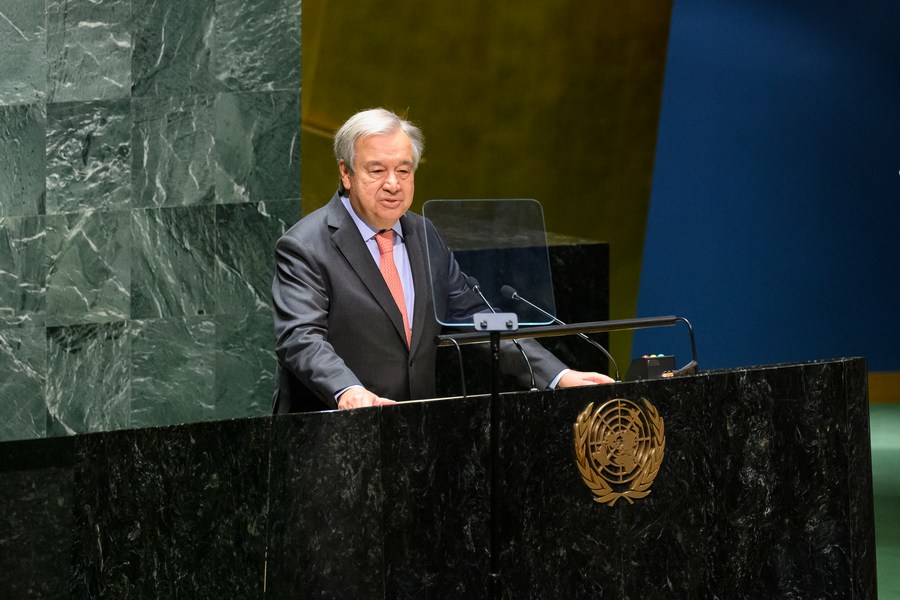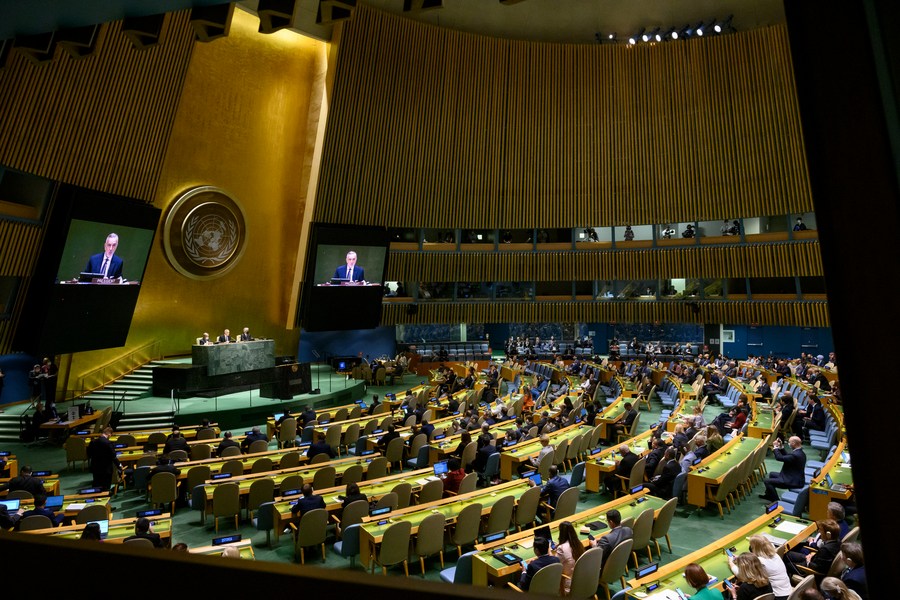UNITED NATIONS, Aug. 2 (Xinhua) — UN Secretary-General Antonio Guterres on Monday highlighted five areas for action to strengthen the Nuclear Non-Proliferation Treaty (NPT).
The first area is to urgently reinforce and reaffirm the 77-year-old norm against the use of nuclear weapons, he told the opening of the 10th NPT Review Conference at the UN headquarters in New York.
This requires a steadfast commitment from all states parties to the NPT. It means finding practical measures that will reduce the risk of nuclear war and put the world back on the path to disarmament. There is a need to strengthen all avenues of dialogue and transparency as peace cannot take hold in an absence of trust and mutual respect, he said.
The second area is to further reduce the risk of nuclear war, he said.
“Eliminating nuclear weapons is the only guarantee they will never be used. We must work relentlessly toward this goal. This must start with new commitments to shrink the numbers of all kinds of nuclear weapons so that they no longer hang by a thread over humanity. And it means reinvigorating — and fully resourcing — our multilateral agreements and frameworks around disarmament and non-proliferation, including the important work of the International Atomic Energy Agency.”

UN Secretary-General Antonio Guterres speaks at the opening of the 10th Nuclear Non-Proliferation Treaty (NPT) Review Conference at UN Headquarters in New York on Aug. 1, 2022. (Loey Felipe/UN Photo/Handout via Xinhua)
The third area is to address the simmering tensions in the Middle East and Asia, said Guterres.
By adding the threat of nuclear weapons to enduring conflicts, these regions are edging toward catastrophe. There is a need to redouble support for dialogue and negotiation to ease tensions and forge new bonds of trust in regions that have seen too little, he said.
The fourth area is to promote the peaceful use of nuclear technology as a catalyst to advance the Sustainable Development Goals, including for medical and other uses, he said.
The fifth area is to fulfill all outstanding commitments in the NPT itself, and keep it fit for purpose in these trying times, he said.
“We are all here today because we believe in the treaty’s purpose and function. But carrying it into the future requires going beyond the status quo. It requires renewed commitment, and real, good-faith negotiations. And it requires all parties to listen, compromise and keep the lessons of the past — and the fragility of the future — in view at all times.”
The 10th NPT Review Conference, which was originally scheduled for April-May 2020, had to be postponed as a result of the COVID-19 pandemic. NPT Review Conferences had been held every five years since 1975.
The 10th Review Conference has been long-delayed. But its importance and urgency remain undiminished. It takes place at a critical juncture for collective peace and security, said Guterres.

The 10th NPT (Nuclear Non-Proliferation Treaty) Review Conference is held at the UN Headquarters in New York on Aug. 1, 2022. (Loey Felipe/UN Photo/Handout via Xinhua)
The climate crisis, stark inequalities, conflicts and human rights violations, and the personal and economic devastation caused by the COVID-19 pandemic have put the world under greater stress than it has faced in our lifetimes. And the Review Conference occurs at a time of nuclear danger not seen since the height of the Cold War, he said.
The initial post-Cold War period ushered in a tentative new hope for peace: a hope found in massive arsenal reductions, in entire regions declaring themselves to be free of nuclear weapons, and in the entrenchment of norms against the use, proliferation and testing of nuclear weapons. And through a combination of commitment, judgment and luck, the world avoided the suicidal mistake of nuclear conflict. But as the years have passed, these fruits of hope are withering, he warned.
“Humanity is in danger of forgetting the lessons forged in the terrifying fires of Hiroshima and Nagasaki. Geopolitical tensions are reaching new highs. Competition is trumping cooperation and collaboration. Distrust has replaced dialogue and disunity has replaced disarmament. States are seeking false security in stockpiling and spending hundreds of billions of dollars on doomsday weapons that have no place on our planet. Almost 13,000 nuclear weapons are now being held in arsenals around the world,” he said.
All these are happening at a time when the risks of proliferation are growing and guardrails to prevent escalation are weakening, and when crises — with nuclear undertones — are festering, from the Middle East and the Korean Peninsula to the conflict in Ukraine and to many other factors around the world, he noted.
“The clouds that parted following the end of the Cold War are gathering once more. We have been extraordinarily lucky so far. But luck is not a strategy, nor is it a shield from geopolitical tensions boiling over into nuclear conflict. Today, humanity is just one misunderstanding, one miscalculation away from nuclear annihilation,” warned the UN chief.
“We need the Treaty on Non-Proliferation of Nuclear Weapons as much as ever. That is why this Review Conference is so important. It’s an opportunity to hammer out the measures that will help avoid certain disaster and to put humanity on a new path toward a world free of nuclear weapons. It’s also a chance to strengthen this treaty and make it fit for the worrying world around us,” said Guterres. ■













